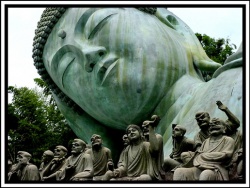Difference between revisions of "Jingtu"
Jump to navigation
Jump to search
(Created page with "thumb|250px| '''JINGTU'''. The Chinese term jingtu ("pure land"), pronounced jōdo in Japanese, refers to the Chinese Buddhist tradition of devotion ...") |
|||
| Line 1: | Line 1: | ||
[[File:Japanese bud.jpg|thumb|250px|]] | [[File:Japanese bud.jpg|thumb|250px|]] | ||
| − | '''JINGTU'''. The Chinese term jingtu ("pure land"), pronounced jōdo in Japanese, refers to the Chinese Buddhist tradition of devotion to Amitābha Buddha in order to be reborn into his Pure Land as a means of attaining enlightenment. Because many Amitābha devotees believed that sincerely chanting Amitābha's name guaranteed salvation in the next life, this practice became an auxiliary spiritual discipline for most Buddhists in East Asia and an important refuge for the laity, but often became a primary and sometimes exclusive orientation in times of crisis. | + | '''[[JINGTU]]'''. The {{Wiki|Chinese}} term [[jingtu]] ("[[pure land]]"), pronounced [[jōdo]] in [[Japanese]], refers to the {{Wiki|Chinese}} [[Buddhist tradition]] of [[devotion]] to [[Amitābha Buddha]] in order to be [[reborn]] into his [[Pure Land]] as a means of [[attaining]] [[enlightenment]]. Because many [[Amitābha]] {{Wiki|devotees}} believed that sincerely [[chanting]] [[Amitābha's]] [[name]] guaranteed {{Wiki|salvation}} in the next [[life]], this practice became an auxiliary [[spiritual]] [[discipline]] for most [[Buddhists]] in {{Wiki|East Asia}} and an important [[refuge]] for the laity, but often became a primary and sometimes exclusive orientation in times of crisis. |
{{R}} | {{R}} | ||
[http://www.academicroom.com/humanities/religion/buddhist-studies/buddhist-sects/jingtu www.academicroom.com] | [http://www.academicroom.com/humanities/religion/buddhist-studies/buddhist-sects/jingtu www.academicroom.com] | ||
Latest revision as of 06:50, 25 April 2014
JINGTU. The Chinese term jingtu ("pure land"), pronounced jōdo in Japanese, refers to the Chinese Buddhist tradition of devotion to Amitābha Buddha in order to be reborn into his Pure Land as a means of attaining enlightenment. Because many Amitābha devotees believed that sincerely chanting Amitābha's name guaranteed salvation in the next life, this practice became an auxiliary spiritual discipline for most Buddhists in East Asia and an important refuge for the laity, but often became a primary and sometimes exclusive orientation in times of crisis.
